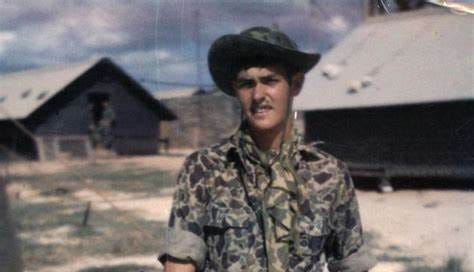On this day in 1949, Charles “Chuck” Mawhinney is born. He is best known for his service in the United States Marine Corps during the Vietnam War.
Mawhinney has been called the “Corps’ deadliest sniper.”
“My father was a Marine during World War II,” he later explained. “I started shooting at a very young age, and he taught me to shoot like the Marines taught him, so there wasn’t any big transition from hunting in Oregon to becoming a sniper.”
He joined the Marines when he was just 18 years old. The Corps saved him from a life of fast cars, drinking, and women that was already threatening to get him into trouble.
Mawhinney returned the favor by saving the lives of innumerable Marines.
He spent the last years of his life trying to help people understand that saving lives was the real role of a sniper. “Saving his Marines meant accomplishing the mission,” Marine Corps veteran Jon Simkins wrote. “And if killing one enemy could diminish the fighting spirit of 10 other combatants who watched him crumple to the ground, then Mawhinney was doing his job. He just happened to be damned good at it.”
Mawhinney was known to hit a target from as far away as 1,000 yards. He was remarkably talented at interpreting how weather, humidity, and the terrain would affect the flight of his bullet.
He was also exceptionally patient.
He spent hours tracking the enemy through dense Vietnamese jungles. Or he would lay motionless in dense foliage for hours at a time, waiting for the enemy. “You get to the point where you start living like an animal,” he said. “You act like an animal, you work like an animal, you are an animal.”
His most famous mission occurred on Valentine’s Day 1969. A Vietnamese platoon was crossing a river at night. “I got 16 rounds off that night as fast as I could fire the weapon,” he later told Business Insider. “Every one of them was headshots, dead center.”
It had taken him all of 30 seconds. Needless to say, the rest of the enemy turned and fled. Mawhinney is credited with stopping a potentially devastating attack on American forces nearby.
Mawhinney was sent home after about 16 months because of concerns about combat fatigue. He briefly served as an instructor at Camp Pendleton before returning to Oregon where he found a job, got married, and had kids.
For decades, no one knew what he’d done—not even his wife.
That all changed in 1991 when a Marine veteran, Joseph Ward, published a book in which he briefly mentioned Mawhinney. Ward had been his spotter on a few occasions, and he reported that Mawhinney had obtained 101 confirmed kills in Vietnam. His claim proved controversial. Had Mawhinney beaten the previous record of 93 kills?
An investigation revealed that Ward’s number was not too high, but too low. Mawhinney had obtained 103 confirmed and 216 probable kills during his time in Vietnam.
Mawhinney finally began talking about his experiences, including one interview with an LA Times journalist. “[B]ecause anonymity was no longer an option,” that journalist wrote, “he decided he could help change the public image of snipers as bloodthirsty assassins. A good sniper, Mawhinney said, saves more lives than he takes because he undercuts the enemy’s will or ability to fight.”
Mawhinney passed away earlier this month, less than two weeks shy of his 75th birthday.
“Chuck was one in a million,” his friend and biographer Jim Lindsay told the Baker City Herald. “Never one to gloat or brag about anything. . . . He was the kind of guy that you’d want to be around. But he didn’t try hard to be that. He’d listen to anybody else’s stories before telling his own.”
Rest in peace, Sir.
Sources can always be found on my website, here.





My husband was in the Marines in Nam in 68. This led to an interesting conversation this AM. TY Tara
He was a brave Marine, good at what he did, and saved innumerable lives. I want to see a movie on this Marine’s life. He is an inspiration. RIP.